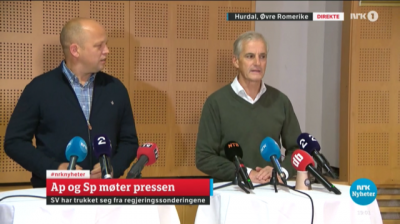NEWS ANALYSIS: Norway’s new prospective leaders have already reinforced the country’s image as a wealthy oil nation with no intention of halting the flow of its own riches to save the climate. Economic growth appears once again to be much more important than tackling climate change, even as another UN climate summit looms later this month.

The sheer value of Norway’s oil and gas became even clearer just this week. The recent sharp rise in the price of both gas and oil has fueled more windfall profits, with analysts and economists gleefully noting how the already affluent Norway has never earned so much on its exports of oil and gas. Prices have since slipped from more than USD 80 a barrel for Norway’s North Sea crude to around USD 77 heading into the weekend, but that’s still higher than its historical average, while gas prices were four times higher than normal and selling at levels twice as high as oil.
“August was a record month, September will be even higher,” Gunnar Torgersen, portfolio manager for the equity fund Holberg Norge, told Norwegian Broadcasting (NRK) on Wednesday. An energy crisis predicted last month because of a lack of rain and wind, which already has sent electricity rates soaring both in Norway and abroad, can be highly profitable indeed.
Most of the record income from the unusually high export levels (Norway’s hydro-electricity is also exported) flows right into the Norwegian treasury or the country’s huge sovereign wealth fund known as the Oil Fund. “We’re talking big numbers, for September the number can be around NOK 80 billion,” Torgersen said. “These are numbers we’ve never seen before.”
Norway can claim as much as 80 percent tax on such “super profits,” after earlier and controversially subsidizing exploration costs to roughly the same degree. Norway’s offshore oil fields currently produce around 2 million barrels of oil and 2 million equivalents of gas every day, with nearly all of it exported. Climate activists have long claimed that in addition to the emissions generated by its own oil activity, Norway should be held responsible for emissions where its gas and oil are burned.
Instead of viewing all this as an embarrassment of riches in the midst of a climate crisis, and worrying about Norway’s minimal reduction in emissions so far, prospective government leaders’ passion for their oil industry remains as high as ever. Labour Party leader and prime minister-elect Jonas Gahr Støre’s surprise decision this week to sacrifice formation of a new majority government with the anti-oil Socialist Left Party (SV), and then continue to negotiate formation of a minority government with just the pro-oil Center Party, sinks any hopes of reining in oil exploration and production to cut carbon emissions.
Støre’s decision to just let SV’s delegation leave the Hurdalsjøen Hotel this week handed an early and huge victory to Center Party leader Trygve Slagsvold Vedum.He never wanted to rule with SV precisely because Center and SV are so at odds over oil policy. Center has long been criticized over an alleged lack of interest in the climate and even has a deputy leader, Ola Borten Moe, who has invested in and works in the oil industry. Moe is also a former oil minister who strongly promoted opening up the Arctic to more oil and gas exploration. Now he’s in line for a new ministerial position in a Labour-Center government.
SV leader Audun Lysbakken made it clear that clashes over oil policy were at the heart of his decision to withdraw from government negotiations, when neither Labour nor Center would go along with SV’s climate-oriented proposals. Støre let SV down the most by turning right instead of left, like voters expected.

“It became a question of credibility in relation to how we can reach climate goals, or whether we have a good enough plan for rapid climate cuts,” Lysbakken told FriFagbevegelse after he gave up trying to coax Labour and Center into finally putting some muscle behind climate measures, along with limits on Norway’s fossil fuel production.
Lysbakken also pointed to the overall picture regarding climate issues and a “more fair system” of sharing the tax burden (SV wants to tax the wealthy at rates much higher than those on moderate incomes), but oil policy clearly sparked the sharpest disagreements.
SV and four other small parties, which collectively won 24.3 percent of the vote last month, generally put climate concerns ahead of oil and gas revenues. Center, Labour, the Conservatives and Progress Party, on the other hand, are most interested in maintaining economic growth and preserving jobs, with Labour leader Støre often claiming that his party wants “to develop, not phase out” Norway’s oil industry.
Not all Labour members entirely agree with that, however. Reaction to Støre’s decision to opt for a minority government instead of backing SV at the expense of Center was remarkably muted among Labour’s rank and file. That’s an ominous sign for Støre. Several Labour politicians, including Labour’s spokesman on oil and energy issues Espen Barth Eide, declined immediate comment instead of clearly backing their leader.
Støre had claimed throughout the election campaign that a three-party coalition with both SV and Center was his first choice, leading voters to believe he’d actively support SV’s positions as a left-wing ally for Labour. Political commentators including those who generally back Labour ended up more than just disappointed: Hege Ulstein in newspaper Dagsavisen had written just before the government talks began that Labour “had little if nothing to win by going into a two-party government with Center.” In a commentary headlined “Jonas must say ‘n0’ to Trygve,” she also wrote that it would be “political madness” to become prime minister of a minority government with Center (which many urban voters despise) and with SV on the outside.”

Yet that’s just what looks most likely to happen. Other commentators were ruthless: Dagens Næringsliv (DN)‘s Frithjof Jacobsen wrote on Friday that “a prime minister who’s pressured into running away from his own campaign promises upon meeting tough political posturing (from Center in this case) will be an extremely weak prime minister.” There was real concern that Støre had let himself be bullied by Center, home to politicians who’ve been accused of such before.
Støre was also under pressure from the leader of Norway’s powerful trade union federation, Fellesforbundet, Jørn Eggum. Eggum had publicly warned last weekend, when the three-party talks took a break, that he didn’t want to hear any talk about any halting of oil exploration in Norway’s offshore territory. Eggum was later quick to praise Støre for “standing by” his oil promises. “When it comes to oil policy, I still don’t think SV has the best solutions,” Eggum told FriFagbevegelse on Wednesday. DN‘s Jacobsen thinks other trade unions “most negative to anything that smells of limiting oil activity” have also realized that Støre caves in to pressure.
‘Slalom skiing’ through Parliament
Støre is still set to become Norway’s next prime minister after Labour won 26.3 percent of the vote, twice Center’s 13.6 percent, but the “loser” label has stuck after he backed down from his own preferred coalition and the one most voters seemed to want. “He’s beginning his prime minister career by losing one of the most important initial battles,” wrote Jacobsen.
That’s also because Støre will have to face two sets of opposition in Parliament instead of just one: both a climate bloc that may organize to include SV, the Liberals, the Reds, the Greens and even the Christian Democrats, and the more traditional opposition made up of the Conservatives and Progress parties. Lysbakken is already warning Støre against “slalom skiing” through Parliament, seeking support from right-wing parties on issues like oil and defense and then swinging to the left-wing parties for support for measures aimed at reducing social differences among Norwegians. They’ve skyrocketed during the oil age, with Norway’s 400 wealthiest people no longer just millionaires. They’re all billionaires, while income gaps have widened dramatically between management and employees.
Støre has also rejected demands from Labour’s own youth organization AUF to stop issuing new oil exploration licenses. AUF leader Astrid Hoem, who’s also disappointed Støre didn’t do more to support SV, noted how the United Nations itself “has declared Code Red. All countries must stop searching for more oil. That includes Norway. It’s our job to drag the party in a greener direction, and we’re working hard for that internally.”
Støre’s reaction was blunt: “That’s not going to happen,” he told Norwegian Broadcasting (NRK), “because it’s not Labour Party policy to call a halt to new (oil) exploration licenses.” Vedum of the Center Party could flash his characteristic grin from ear to ear even though he seemed to make efforts at press briefings this week not to appear too smug.

It all confirms that even though Støre claimed repeatedly throughout the election that Norway needed “to go in a new direction,” there will be no major changes in the consistently pro-oil policies of past governments including the last, defeated, Conservatives-led government. Instead it will mostly be “business as usual,” even as complaints fly that Støre has all but defied the will of the voters. Commentator Ulstein also fears Støre and Labour risk being pressured towards the non-socialist side of Norwegian politics, and then back to the left side in full public view, and that would generate a new round of discontent within Labour. She even posed the notion that Labour, as Norway’s largest single party, could then just as well try to rule alone.
Støre, who served as foreign minister under Jens Stoltenberg and was known for his diplomatic skills, has tried to downplay the split with SV, and insists that a government he leads will address climate issues and cut emissions. “We agree on the goal, but simply have different views of how to reach it,” Støre told reporters earlier this week. “We spent a lot of time in preparing our own party program about how we can cut emissions, create jobs, develop instead of phasing out. We have a big industry we need to take good care of.”
More creative defense of Norwegian oil
Both Støre and Vedum have already come up with more “creative” defenses for Norway’s oil industry in addition to those used in past years to justify its existence and expansion when the world should consume less, not more oil. Now they’re stressing an ongoing need for the “competence” built up over the years in the offshore sector, and how it can be transferred to new “green” ventures like offshore wind energy, or battery and hydrogen production.
“There’s a lot of competence in the industry that we need to preserve in order to succeed with a green shift,” Støre said. “It’s those working on oil and gas projects now who are moving over to renewable energy projects. That’s a main way to reach climate goals.”
He also claimed the “for Labour, activity is important to reach those goals,” while adding that “we have powerful ambitions for what we (Labour and Center) can achieve together.” Vedum, meanwhile, called for “stability” around oil and gas policy. “That’s a given in a government led by Labour and Center,” Vedum said.
Their government negotiations are due to begin in earnest from Monday, with Støre aiming to have a new Labour-Center coalition in place right after the state budget is presented in mid-October.
newsinenglish.no/Nina Berglund

